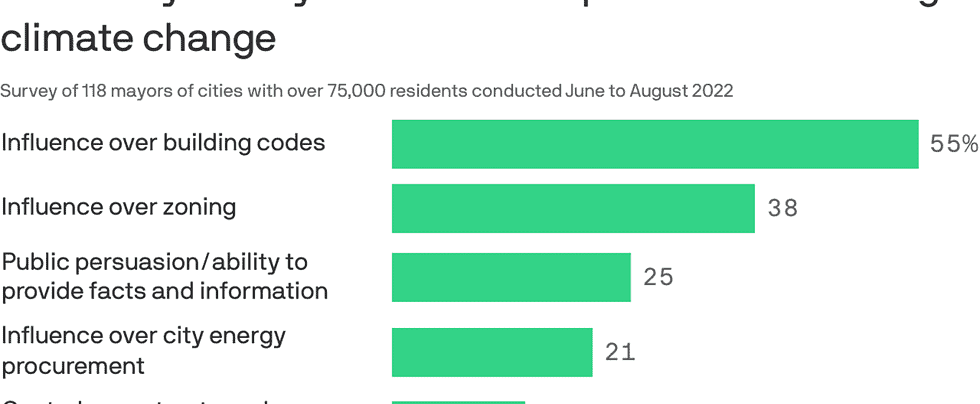- They do favor less controversial steps, like replacing gas-guzzling city vehicles with electric alternatives and supporting solar power, according to the first findings from the 2022 Menino Survey of Mayors, a nationally representative survey of U.S. mayors.
- Eighty-seven percent of Democratic mayors see a need for significant financial investments in climate action, vs. 43% of Republicans.
- Mayors on both sides of the aisle support replacing municipal vehicles with more fuel-efficient ones (75%) ...
- ... but Democrats are far more likely to support a variety of other measures, such as requiring that new construction be solar-ready or using local money to support private home energy upgrades.
The intrigue: The survey — released this week to coincide with the annual winter meeting of the U.S. Conference of Mayors — reflects a big gap between what mayors say they wish they could do, and what they think is realistic.
- One mayor told the pollsters they "wanted to ban leaf blowers" but "did not have the support."
- Another — described as "a progressive big-city mayor" — said of oil and gas restrictions: "[We're] not doing it, but ultimately, [it's] the right thing to do."
- A third said restrictions on gas and oil would flop and that they "would be hung" for going after lawn tools.
Zoom in: Republican mayors overwhelmingly oppose restrictions on gas stoves, gas and oil heat, and gas-powered lawn tools.
- They also reject moves aimed at reducing car use, such as congestion fees and higher parking prices.
- Between a third and a half of Democratic mayors also oppose such restrictions.
Yes, but: Nearly all mayors worry about climate impacts on their cities — only 3% said they did not.
- Seventy-three percent of mayors agree that cities should be willing to expend resources and incur costs to address climate change.
- Fifty-five percent agree that making "real progress on climate issues" will require that residents "make real sacrifices." (26% disagree.)
- Mayors from both parties strongly support purchasing electric school buses, fire trucks, and public works vehicles.
Between the lines: Many mayors see their influence over building codes as their most powerful climate tool (55%), followed by influence over zoning (38%), their own powers of public persuasion (25%), and influence over procurement (21%).
- Only 8% cite their authority to ban or limit behaviors — like driving or using gas appliances — as a useful tool.
The big picture: "Mayors in general, across party lines, are eager and committed to taking steps at the local level to fight climate change," David Glick, co-author of the Menino Survey and associate professor of political science at Boston University, tells Axios.
- But "we're also seeing that there are limits — that they are constrained by politics, by money, and by other realities."
Methodology: The 2022 Menino Survey included 118 mayors of U.S. cities with populations of more than 75,000. They hailed from 38 states and were interviewed throughout the summer.
- The survey, a joint project of the B.U. Initiative on Cities and the Rockefeller Foundation, previously examined attitudes toward homelessness, and repercussions of the pandemic.













